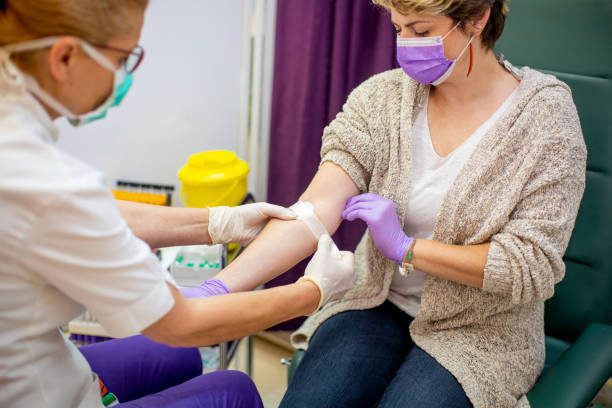
| Phlebotomist Key Stats | |
|---|---|
| Avg. Salary / year | $32,010 |
| Avg. Pay / hour | $15.39 |
| Education | 0-1 Year |
| Job Outlook | 23% |
It takes a special person to make a living as a Phlebotomist.
This is because Phlebotomists are responsible for withdrawing blood for a variety of purposes including transfusions, blood donations, patient tests and for researching purposes.
Phlebotomy is a specialized profession in the medical field.
Individuals pursuing this career can expect healthy job growth and plenty of job opportunities in a variety of health care settings.
Because Phlebotomists are required to withdraw blood, individuals must be comfortable dealing with needles, have a high level of attention to detail, be at ease working with blood, and be easygoing with patients who may be afraid of the procedure.
Table of Contents
Education Requirements to Become a Phlebotomist
Individuals who want to become a phlebotomist must have a combination of innate qualities in addition to advanced educational requirements after graduating high school.
Those who are detail-oriented, have hand-eye coordination, and are able to work well with patients and blood would benefit in looking into this profession as a career as these qualities are sought after by employers.
In addition, it is recommended an individual be certified as the majority of employers seek candidates with this qualification.
An individual can enlist in a Phlebotomy program offered by community colleges, technical schools, or vocational schools.
Phlebotomy programs typically last less than a year to complete and guarantee a diploma or certificate at the end of the program.
These programs typically include a variety of classes and laboratory experience that prepare individuals to become a Phlebotomist.
Programs will include classes in medical terminology, anatomy and physiology.
In addition, individuals who want to become a Phlebotomist may also have the opportunity to seek on the job training after graduating from high school.
Candidates pursuing this route must also seek certification in order to work in this profession.
Individuals must seek certification through an accredited organization such as the American Medical Technologies AMT or the National Center for Competency Testing NCCT.
Individuals may visit any of these professional websites to pursue certification in Phlebotomy.
Phlebotomist Job Description
Although a Phlebotomist should expect to work full time in this position, an individual’s work schedule will depend on the type of agency they work for.
For example, Phlebotomists who work for a hospital or medical lab can expect to work nights, weekends and even holidays, while Phlebotomists who work for clinics can expect to work typical business hours.
Hours may vary because of the urgency for the need of blood.
Phlebotomists work with individuals who would like to donate their blood, or with patients whose doctors have requested an analysis of their blood for further testing.
Depending on the donor or patient, a Phlebotomist may also mentally prepare individuals who are nervous about getting their blood withdrawn.
A nervous individual may cause a Phlebotomist to make a mistake if it is difficult for them to access a vein.
Before withdrawing blood, a Phlebotomist must also verify a patient’s identity by asking specific information in regards to the patient’s personal information.
After the identity is confirmed, the Phlebotomist will withdraw blood and label the vials appropriately to send to a lab for an analysis and testing.
One important task that Phlebotomists must do on a regular basis is to keep their work area, needles, test tubes, and blood vials clean in order to reduce contamination and other possible infections.
This task is of utmost importance because of the high incidence of bodily fluids.
Completing this task regularly will promote safety standards for all patients.
Phlebotomist Salary and Career Path
Aspiring Phlebotomists can expect to earn approximately $29,730 per year which was the median wage for these professionals in 2012.
In addition, future Phlebotomists can expect an increase of 27 percent in job openings for this profession.
This increase is expected to occur through the year 2022.
This projection comes from the increase in demand for health care services and preventive care.
For individuals who like to work with people and are unafraid of needles and a little blood, a profession as a Phlebotomist may be the perfect fit.
Not only is this profession a specialty in the health care field, but it is also expected to increase in demand through the end of this decade.
![]() The below information is based on the 2021 BLS national averages.
The below information is based on the 2021 BLS national averages.
National Average Salary
$38,450Average Salary by State
| State | Avg. Annual Salary |
|---|---|
| Alabama | $32,010 |
| Alaska | $42,630 |
| Arizona | $37,040 |
| Arkansas | $32,980 |
| California | $48,070 |
| Colorado | $40,500 |
| Connecticut | $41,820 |
| Delaware | $42,520 |
| District of Columbia | $45,390 |
| Florida | $35,710 |
| Georgia | $37,480 |
| Idaho | $35,120 |
| Illinois | $38,570 |
| Indiana | $34,980 |
| Iowa | $34,050 |
| Kansas | $35,020 |
| Kentucky | $34,890 |
| Louisiana | $32,100 |
| Maine | $34,160 |
| Maryland | $41,790 |
| Massachusetts | $44,020 |
| Michigan | $36,250 |
| Minnesota | $39,840 |
| Mississippi | $33,980 |
| Missouri | $35,670 |
| Montana | $35,820 |
| Nebraska | $34,270 |
| Nevada | $35,170 |
| New Hampshire | $40,500 |
| New Jersey | $40,570 |
| New Mexico | $34,460 |
| New York | $45,390 |
| North Carolina | $36,250 |
| North Dakota | $36,760 |
| Ohio | $35,770 |
| Oklahoma | $33,030 |
| Oregon | $41,350 |
| Pennsylvania | $37,930 |
| Rhode Island | $43,010 |
| South Carolina | $34,530 |
| South Dakota | $31,440 |
| Tennessee | $34,910 |
| Texas | $35,340 |
| Utah | $34,820 |
| Vermont | $37,530 |
| Virginia | $37,080 |
| Washington | $43,770 |
| West Virginia | $32,530 |
| Wisconsin | $37,700 |
| Wyoming | $34,510 |
| Puerto Rico | $20,920 |
The top earning state in the field is California, where the average salary is $48,070.
These are the top 5 earning states in the field:
* Employment conditions in your area may vary.
Frequently Asked Questions
What is a phlebotomist?
Phlebotomists are specialists who draw blood for tests, research, transfusions, and blood donation.
They also have the role of explaining the process of drawing blood to their patients and to provide assistance if their patients have reverse reactions.
Phlebotomists have to label the blood samples for testing or processing, enter patient information into a database and keep work areas sanitary.
In order to be able to perform all these tasks, phlebotomists need a variety of skills, including compassion, dexterity, good hand-eye coordination, and physical stamina.
Phlebotomists can work in a variety of settings, such as hospitals, labs, or blood banks.
How much does a phlebotomist make?
According to the Bureau of Labor Statistics, the median annual pay for phlebotomists was $34,480 as of May 2018.
Salaries in this field vary based on a variety of factors and some phlebotomists earn less than $26,000, while others make around $50,000 a year.
How much does it cost to become a phlebotomist?
In order to become a phlebotomist, you will typically need to complete a post-secondary phlebotomy program.
Training programs for future phlebotomists are available at many vocational schools, community colleges, and technical schools and can cost anywhere between $200 and $3,000, depending on the school you choose and the program itself.
In some cases, phlebotomists enter the profession with a high school diploma and are trained on the job.
In order to have better job prospects, you should seek certification from one of the several organizations that offer these types of credentials.
To qualify for certification, you will usually need some classroom education and clinical experience and you will have to pass a written exam and, in some cases, a practical test.
What is the demand for phlebotomists?
According to the Bureau of Labor Statistics, employment for phlebotomists is expected to grow 23 percent from 2018 to 2028.
Demand for phlebotomists is expected to remain high as blood tests continue to be an important tool in helping doctors diagnose illnesses.
Phlebotomists who hold a professional certification should have the best job prospects.
How long does it take to become a phlebotomist?
In order to enter this occupation, you will typically need a diploma in phlebotomy from a community college, vocational school or technical school.
Training programs for phlebotomists are typically 4 to 8 months long, depending on the school.
In some cases, you may be able to find employment in this field with only a high school diploma and receive some on-the-job training.
Many employers prefer phlebotomists who are certified by one of the several organizations that offer these types of credentials, such as The National Center for Competency Testing, National Healthcareer Association, the National Phlebotomy Association and the American Society for Clinical Pathology.
In order to become a certified phlebotomist, you will typically need a post-secondary diploma in the field, some clinical experience and you must pass an exam.













